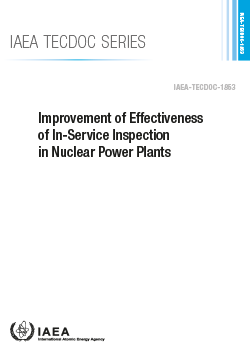Description
This publication outlines the main aspects and issues to be considered when developing and improving in-service inspection effectiveness in nuclear power plants (NPPs). It also provides the status of in-service inspection practices in NPPs in selected IAEA Member States, evaluating criteria for effective traditional in-service inspection and introducing the concept of risk-informed in-service inspection. The strategies for improving in-service effectiveness discussed in this publication consider the entire framework of in-service inspection, including effective selection of the proper inspection scope, inspection interval and non-destructive examination efficiency.
More Information on reusing IAEA copyright material.
Keywords
Nuclear Power Operations, NPPs, Nuclear Power Plants, Safety Measures, Nuclear Reactors, Maintenance and Repair, Nondestructive Testing, Effectiveness, ISI, In-Service Inspection, Practices, Member States, Criteria, Concept of Risk, Strategies, Inspection Interval, NDE, Non-Destructive Examination Efficiency, Techniques, Technologies, Evaluation, Constitutive Elements, Recommendation, Performance, Life Management, ISI Codes, Standards, Structural Integrity, Components Reliability, Maintenance, Repair, Plant Operation, Technical Disciplines, Models, Risk Informed Assessment, NDE Methodology, NDE System Qualification, ISI Programme, Principles, Implementation, Correlations, Structural Integrity, Assessment, Mitigation, Repair, Replacement Action, Human Factors, Nuclear Safety, Inspection Qualification Process, Roles and Responsibilities, Design, Operational Experience, Cost, Defence in Depth, Requirements, RI-ISI Organization, Preventive Failure Analysis, Ageing Phenomena



